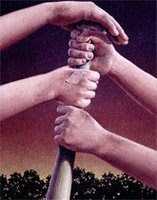
A few weeks ago, I was shuffling toward the basement shack with a steaming cup of coffee in one hand and the morning paper in the other. What began as a typical Saturday morning, turned into one of those lessons that life seems to hand you from time to time. Let me tell you about it.
I turned the dial up into the phone portion of the band on my ham radio in order to listen to a Saturday morning swap net. Along the way, I came across an older sounding chap, with a tremendous signal and a golden voice. You know, the kind, he sounded like he should be in the broadcasting business. He was telling whomever he was talking with something about “a thousand marbles.”
I was intrigued and sat down to listen to what he had to say. “Well, Tom, it sure sounds like you’re busy with your job. I’m sure they pay you well but it’s a shame you have to be away from home and your Family so much. Hard to believe a young fellow should have to work sixty or seventy hours a week to make ends meet. Too bad you missed your daughter’s dance recital.”
He continued, “Let me tell you something Tom, something that has helped me keep a good perspective on my own priorities.” And that’s when he began to explain his theory of a “thousand marbles.”
“You see, I sat down one day and did a little arithmetic. The average person lives about seventy-five years. I know, some live more and some live less, but on average, folks live about seventy-five years.”
“Now then, I multiplied 75 times 52 and I came up with 3900 which is the number of Saturdays that the average person has in their entire lifetime. Now stick with me Tom, I’m getting to the important part.”
“It took me until I was fifty-five years old to think about all this in any detail,” he went on, “and by that time I had lived through over twenty-eight hundred Saturdays. I got to thinking that if I lived to be seventy-five, I only had about a thousand of them left to enjoy.”
“So I went to a toy store and bought every single marble they had. I ended up having to visit three toy stores to roundup 1000 marbles. I took them home and put them inside of a large, clear plastic container right here in my workshop next to the radio. Every Saturday since then, I have taken one marble out and thrown it away.”
“I found that by watching the marbles diminish, I focused more on the really important things in life. There is nothing like watching your time here on this earth run out to help get your priorities straight.”
“Now let me tell you one last thing before I sign-off with you and take my lovely wife out for breakfast. This morning, I took the very last marble out of the container. I figure if I make it until next Saturday then God has blessed me with a little extra time to be with my loved ones...”
“It was nice to talk to you Tom, I hope you spend more time with your loved ones, and I hope to meet you again someday. Have a good morning!”
You could have heard a pin drop when he finished. Even the show’s moderator didn’t have anything to say for a few moments. I guess he gave us all a lot to think about. I had planned to do some work that morning, then go to the gym. Instead, I went upstairs and woke my wife up with a kiss. “C’mon honey, I’m taking you and the kids to breakfast.”
“What brought this on?” she asked with a smile.
“Oh, nothing special,” I said. “It has just been a long time since we spent a Saturday together with the kids. Hey, can we stop at a toy store while we’re out? I need to buy some marbles.”
By Jeff Davis
